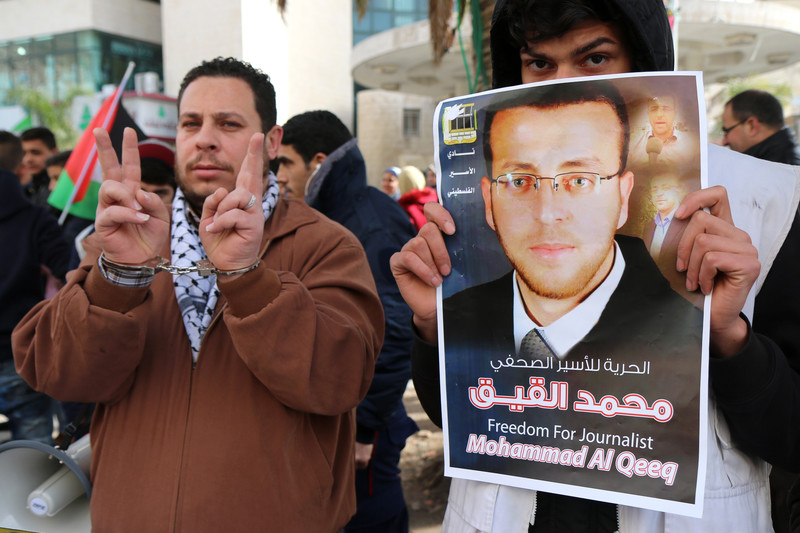Rights and Accountability 27 January 2016

Palestinians in the West Bank city of Nablus rally in solidarity with Muhammad al-Qiq on 24 January.
ActiveStillsJournalist Muhammad al-Qiq is to remain in detention, despite his critical condition after 63 days of hunger strike, Israel’s highest court ruled on Wednesday.
Al-Qiq has consumed nothing but water during his two-month protest of his detention without charge or trial under an administrative detention order issued by an Israeli military court.
Jawad Boulos of the Palestinian Prisoners Society said al-Qiq is partially paralyzed and has trouble speaking. His legal team warned that his organs are at risk of failure any day.
No negotiations
Israel has refused to negotiate with al-Qiq, Boulos said. Instead, Israeli authorities have tried to pressure al-Qiq to end his hunger strike by bringing food to his bedside and denying him access to his lawyer, family and an independent physician.
Al-Qiq’s wife, Fayha Shalash, has been told that her husband’s life is in real danger and he may not survive many more days of hunger strike.
HaEmek hospital, where al-Qiq has been held since late December, has refused independent examination by a doctor with Physicians for Human Rights-Israel, Amany Dayif, director of the group’s prisoner and detainees department, told The Electronic Intifada.
“That raises a lot of questions, especially in light of al-Qiq’s statements about being treated against his will,” Dayif said.
On 10 January, prison guards at the civilian hospital shackled al-Qiq to his bed while a medical team put an IV into his arm to forcibly administer salts and minerals. The IV remained in his arm for four days, according to the Palestinian prisoner advocacy group Addameer.
Amnesty International has condemned these measures as tantamount to torture.
Addameer stated that any treatment without consent could put al-Qiq’s life in danger, pointing to the deaths of Palestinian prisoners held by Israel who were force-fed during a mass hunger strike in 1980.
Torture
Al-Qiq, 33, began his hunger strike on 25 November, four days after he was arrested in the middle of the night from his home in the occupied West Bank city of Ramallah.
Initially, al-Qiq stopped eating to protest his brutal interrogation. He remained on hunger strike when he was placed under administrative detention on 17 December.
Molly Malekar, program director at Amnesty International Israel, told Haaretz that al-Qiq should be put on trial or released.
“Instead, [Israel is] choosing a third option, which is to cause the death of a prisoner who is apparently innocent of any crime,” she said.
Al-Qiq was tortured during his first two weeks of interrogation and denied access to a lawyer, according to his lawyers and Addameer.
For up to 15 hours a day, al-Qiq was tied to a chair in a contorted position. He was threatened with sexual violence and a lengthy prison sentence if he did not confess to allegations against him.
The first time he saw his lawyer was at a hearing at Ofer military court on 24 December. Al-Qiq was so weak he appeared in the courtroom in a wheelchair.
Allegations
A journalist with the Saudi news agency Al Majd, al-Qiq has also written opinion pieces for local Palestinian outlets.
Human rights groups and Palestinian journalists have accused Israel of detaining al-Qiq because of his press work.
A military court judge told al-Qiq that the secret file of evidence against him includes incitement to violence. The file also alleges that he worked with Hamas-affiliated media and accuses him of posing a “threat to the security of the area.”
On Tuesday, a few dozen journalists and politicians protested outside the hospital where al-Qiq is being held. The demonstration, organized by I’lam, a Palestinian group in Israel that campaigns for media freedoms, was joined by several Palestinian members of Israel’s parliament, the Knesset.
One of those lawmakers, Basel Ghattas, sent a letter to Israel’s public security minister, Gilad Erdan, warning: “You have the power to prevent further deterioration in the prisoner’s condition and to prevent the serious public ramifications that can be expected if any harm befalls the prisoner.”
In its Wednesday ruling, the high court said it would continue to monitor al-Qiq’s situation.
The court took a similar position with hunger striker Muhammad Allan last August, freezing his administrative detention only when medical tests indicated the prisoner had suffered brain damage as a result of his protest.
Allan was only released on 4 November, when his detention order expired.







